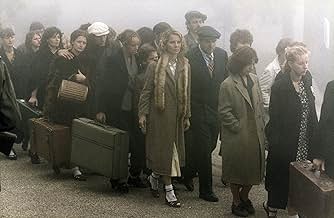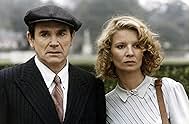AVALIAÇÃO DA IMDb
7,3/10
2,9 mil
SUA AVALIAÇÃO
Adicionar um enredo no seu idiomaThe intertwined lives of three generations of musicians and dancers from Russia, Germany, France and the U.S., from before World War II through the war and the Holocaust, to the 1980s.The intertwined lives of three generations of musicians and dancers from Russia, Germany, France and the U.S., from before World War II through the war and the Holocaust, to the 1980s.The intertwined lives of three generations of musicians and dancers from Russia, Germany, France and the U.S., from before World War II through the war and the Holocaust, to the 1980s.
- Prêmios
- 1 vitória e 6 indicações no total
Avaliações em destaque
I was in Strasbourg, France in 1981 when this film first came out and saw it in a movie theater. It was a compelling film and spoken not only in French, but German, Russian and English, according to the character's language. I loved the story, the music (my favorite rendition of Bolero), the incredible dancing, the acting. I even acquired the soundtrack and a VHS of the movie after seeing it, even though I don't typically acquire copies of movies once I have seen them. This film is and will always be my favorite film of all time. I happened to be studying the subject of international human rights law in Strasbourg at the time, so it seemed fitting to see this movie about WWII and the humanitarian aspects of the finale of the film. Our world has become so interdependent that other directors should take note of this little-known film and its use of multiple languages to great effect.
10Guy33134
Well, I'm obviously not alone in saying this is the best, the greatest, the finest movie, etc. So what's with the rating? Again, as in many cases of movies with few votes, a small group skews the score to a ridiculous level. I saw this masterpiece in Paris when it came out in the early 1980's, and went back to see it the nest day. It was too much exquisite detail to take in during one sole session. The development of the characters, interwoven into the fabric of tragedy that was the war, the haunting Bolero by Ravel. Devastingly beautiful touching, and grand. Since this film, Lelouche (A MAN AND A WOMAN, LES MISERABLES (1994) has made a few films touching on his autobiographical experiences as a young Jew, during the Holocaust. This movie was made before there were dozens of them to compare to, like Lelouche's own perhaps just as good LES MIS... with Jean-Paul Belmondo. Having lived in France, I know there are many cinephiles who just outright hate Lelouche. These feelings, as I have experienced them, are thinly-veiled anti-semitic feelings. Say, it may be an "artsy" way of saying I'm an anti-semite: J'aime pas Lelouche. I think this is why this movie is undeservedly ranked so low in this base. I came across, and voted on it a while back, precisely because the rating shocked me so. As I went through the comments though today, I was happy to see I was not alone, and thought I would throw my "ten francs worth" in. I want to buy it for my collection.
I happened to be in Paris when this film was released. I was able to see it three times in 2 weeks at a theater who did English Subtitles. What an incredible movie. Unfortunately, it was released within months of Blake Edwards "10" which also used "Bolero" as it's main theme and that movie went over big time in the US, so distributors had a problem getting this film out. I wish they would re-release it. The thing I enjoy the most about it is the director's multiple uses of the actors. Many play their characters children and grandchildren. It is also an incredible look at a time when the world was trying to blow each other up and it shows that people everywhere just want the same things. A brilliant film.
I saw this film when it first came out in Paris. It was a great experience! An epic sweep, not unlike *Gone With the Wind* or *Children of Paradise*. But the American release, titled *Bolero*, had about 20-30 minutes cut from it and it was a disjointed mess. Small wonder it bombed here. The video release is of the American version. If at all possible, try to see the original, 3 hour release.
Just viewed this movie on a DVD from Netflix. This movie is what a motion picture can be in the hands of an intelligent and talented director.
The photography was wonderful, the use of color was spectacular, the sound was excellent, and the music and performances were top notch. I especially liked the full symphony orchestra segments and the American big band segments. The Folies-type musical numbers were also done with flair, and Geraldine Chaplin proved herself to be a classy cabaret singer (assuming her voice wasn't dubbed). Michel Legrand I believe was responsible for the music, which was first rate throughout.
All production values were of the highest order.
The final dance sequence, which lasted far longer than anything Hollywood would permit, was phenomenal; the late Jorge Donn was not Nureyev, but spectacular all the same. The robustness and uncompromisingly balletic style of the finale put the ballet sequences in a couple of American movies--American In Paris and Carousel-- in the shade.
Released in the U.S. as Bolero, apparently. Without car chases, explosions, etc., I doubt if it did very well at the box office over here.
The photography was wonderful, the use of color was spectacular, the sound was excellent, and the music and performances were top notch. I especially liked the full symphony orchestra segments and the American big band segments. The Folies-type musical numbers were also done with flair, and Geraldine Chaplin proved herself to be a classy cabaret singer (assuming her voice wasn't dubbed). Michel Legrand I believe was responsible for the music, which was first rate throughout.
All production values were of the highest order.
The final dance sequence, which lasted far longer than anything Hollywood would permit, was phenomenal; the late Jorge Donn was not Nureyev, but spectacular all the same. The robustness and uncompromisingly balletic style of the finale put the ballet sequences in a couple of American movies--American In Paris and Carousel-- in the shade.
Released in the U.S. as Bolero, apparently. Without car chases, explosions, etc., I doubt if it did very well at the box office over here.
Você sabia?
- CuriosidadesFrancis Lai: The composer appears as the blind accordion player.
- Erros de gravação(at around 1h 21 mins) The soldiers are playing cards on the train and the game they are playing changes between shots.
- Cenas durante ou pós-créditosThe grand majority of the opening credits are spoken by the narrator. The narrator stops after crediting the choreographer. Only the film's production company, title and the name Claude Lelouch appear in writing before the Bolero dance at the opening (when the writing is onscreen, the orchestra is warming up). Also, a quote by Willa Cather appears at the very beginning.
- Versões alternativasPresented on French television in a 6 hours version quite clearer then the shortened American release. Richard Bohringer and Fanny Ardant's characters, for example, are better developed.
- ConexõesEdited into Les uns et les autres (1981)
- Trilhas sonorasFolies Bergère
Music by Francis Lai
Lyrics by Boris Bergman
Performed by Catherine Russell and Ginette Garcin
Principais escolhas
Faça login para avaliar e ver a lista de recomendações personalizadas
- How long is Bolero?Fornecido pela Alexa
Detalhes
- Data de lançamento
- País de origem
- Centrais de atendimento oficiais
- Idiomas
- Também conhecido como
- Bolero
- Locações de filme
- Garancières, Yvelines, França(Railway crossing and station scene)
- Empresas de produção
- Consulte mais créditos da empresa na IMDbPro
- Tempo de duração
- 3 h 4 min(184 min)
- Cor
- Proporção
- 2.35 : 1
Contribua para esta página
Sugerir uma alteração ou adicionar conteúdo ausente
































